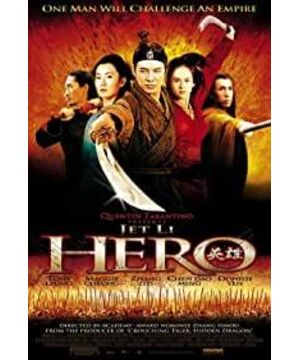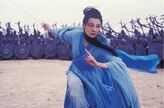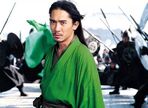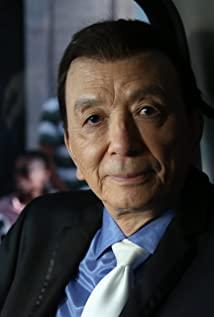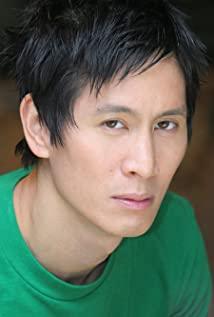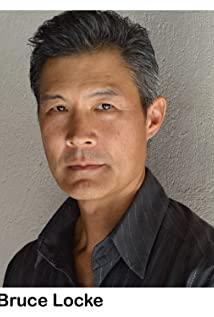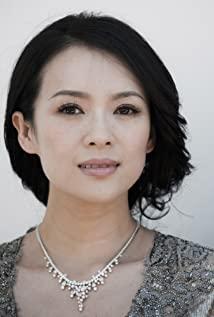Once we scrambled to read famous novels, but now sometimes we feel how ordinary and mediocre the classics are. This year, there are two films that originated from famous novels by netizens. One is Zhang Yimou's Golden Armor, and the other is Feng Xiaogang's Night Banquet. After Chen Kaige's Wuji was beaten and even spoofed last year, many of us continue to express our disdain for this kind of commercial blockbuster.
In fact, whether it is Zhang Yimou, Chen Kaige, or Feng Xiaogang, in their commercial blockbusters, they all inherit the consistent personal things. My way is consistent, in Promise, Chen Kaige just re-analyzed his personal desires, and his perspective has not changed much compared to Farewell My Concubine. Freud and Jung had penetrated deep into his consciousness. And in the night banquet, Feng Xiaogang just once again raised the banner of his unique personal perspective and emotional entanglement among the characters, and then played the signboard of the adaptation of the famous book in a high-sounding manner. #Previously displayed on the homepage#
Outside of these three films, the hero who pioneered China's commercial operation seems to have been forgotten. This film with mixed reviews seems to me to be the most misunderstood. The meaning it carries is much larger than any of the above films. This gorgeous blockbuster, thought to be a clumsy tale of an alternate version of Jing Ke's assassination of Qin, actually speaks of a modern dilemma. Most people are attracted by the gorgeous palaces and gorgeous stars and the emotional entanglements among them. In fact, these are all tricks. If this symbolic film is viewed from the perspective of the theme, it will be a different world. The hero is actually an allegory for us facing modern culture.
Depth of field one, who is Wuming?
No name, black clothes, small build. Li Lianjie's image is not tall, in this film he is not a hero, but a small person, a small person with high martial arts who could have been regarded as a hero. What he wants to fight is the unified spirit represented by Qin Shihuang and Chen Daoming. This unified spirit is like thousands of identical feathered arrows, such as the soldiers of the state of Qin played by the solemn and numb people of the People's Liberation Army. For example, in many of the Qin people in the film, only the emperor Chen Daoming has a little vitality and thinking, while others, especially the ministers, completely disappeared in the empty Qin Palace, not the people who accompanied Jing Ke when he went to the palace. Fan Yuqi's head was only able to get closer to Qin Wuyang. Qin State is highly centralized, the only leader Qin Shi Huang's thought is called thought.
What's behind this oneness? Is it the pursuit of efficiency or the yearning for stability? The king of Qin believed that the widow is for the world, the people of the world and the people of the world are blessed because of me. How familiar is this self-proclaimed savior of Jesus! On the other hand, should the so-called niche demands be sacrificed for the so-called public interests and ultimate meaning? How do self-proclaimed elites and heroes who are outside the system find their place? How to keep yourself in the face of great pressure?
Therefore, only the arrows of Qin soldiers, the arrows shot at the cultural city of Zhao State, thousands of arrows are like locusts like ox feathers, and the soldiers in the house are hit by arrows and fall to the ground. The solitary broken arrow Feixue is resisting the flying arrow with the sword in his hand. How many different font changes are there? It is difficult to understand and write carefully. Is it the reason why the literati must be killed? Does the brush really carry such a meaning? I doubt it.
The soldiers outside the door are heavy, the spears, bows and arrows, and the sharp weapons for killing are always the same, but inside the door, the minds of the scholars, the brushes in their hands, and their inner activities under their focused and quiet faces are still the same?
Anonymous is an ordinary person. Facing the great talent of the first emperor, he flinched. The existence of individuals, small groups and large groups is more meaningful and beneficial to Qian Shou Li Shu. He does not know how to make a judgment. Another reason for his retreat was that King Qin saw his tricks. King Qin's self-confidence and paradoxical cultural high profile drowned out his value judgment from an individual perspective.
Depth of Field II, Remnant Sword + Flying Snow
Why is Liang Chaowei a broken sword? Can Can Jian be someone else? Can the broken sword not die? Not many people will look into these. In fact, the broken sword is an independent cultural character, similar to the last noble. And this cultural character is degrading itself, declining and dying. This cultural character is niche, doomed to be marginalized and die, like some so-called literature of our time. Liang Chaowei's delicate and decadent facial features carefully outline the faces of these literate people. He used a solitary sword and flying snow to resist those arrows and spears that ruled the world, and he would eventually fail in isolation. Although a culture that emphasizes individualism emphasizes respect for the individual, it may be difficult to unite. The three different stories of Can Jian and Feixue are actually in this era. Tragic ending. Especially in the section where Liang Chaowei and Maggie Cheung broke up and Canjian changed to embrace Zhang Ziyi - Cultural people are also human, and they have their own bad moments. When human nature is fully exposed, good and evil flow naturally, it may not be able to resist the group machine that destroys human nature. . It lingers because of multiple possibilities, and is naturally weaker.
Feixue is of noble birth, which is a metaphor for the current white-collar beauty. In fact, under their pride and self-esteem, there is no lack of weakness and boundless desires. They will hate and give up because of men's disregard, they will also be jealous, and they will suddenly retreat weakly when they face major problems. The same is true for the broken sword. If it is not so, why would he willingly hand over the plan of revenge to the unknown Wuming? Where does the support of believing in his character and martial arts come from? What can we see here other than the cliché "petty-bourgeois weakness" in official history textbooks?
Depth of Field III, the three independent stories of the whole play, the relationship between characters and endings and their revealing significance
In fact, whether it is the elite or the masses, we are only living within the boundaries set by the environment. Can Jian and Feixue, and then nameless, both use personal assassination as their appeal. This shows their elitist or self-proclaimed elitist nature. Especially Wuming, who swayed between insignificance and high-ranking, when he was looking at the thousands of arrows that were about to shoot through him before he died, he looked at the blurry-faced soldiers of the Qin State, did he ever feel a sense of identity and a sense of belonging? He practiced a good martial arts, and his tongue moved Can Jian Feixue, but he was able to put it in the wrong place, and people took the wrong path. Seriously questioned Wuming's motive for assassinating the King of Qin. He is an angry young man who thinks he is an elite, who is self-righteous and echoes the cry of the original minority and the public.
The three possible stories of Can Jian and Fei Xue mean different endings for the intellectual elite in the context of the big era. Which one to take depends on the bloom and choice of one's own humanity.
Ruyue is another symbol. Righteous servants and loyal ministers are loved by the public. Occasionally gossip is also a psychological need of people. In comparison, Ruyue is more pop culture, she is just a little spice in the soup, a key to unlock Liang Chaowei's psychological appeal similar to that of Zhuang Zhidie in Jia Pingwa's abandoned capital. In the end, the destination of the beautiful servants reinforces the meaning of her as a vassal and a symbol to please the public.
Chen Daoming's Qin Wang is my least favorite character. In his self-righteous righteousness, he ruthlessly crushed people's independent consciousness. At the end of the play, the scene where the countless mobs he cultivated neatly shouted the nameless execution (Khan, why do I think of Korean fans?) made me even more convinced that he is a cultural tyrant, under the so-called moral banner under the guise of beauty A villain who commits murder. He reminds me of autocratic regimes, Hitler and Stalin, who are enslaving countries and peoples by personal will.
The nameless ending makes us all seem a little surprised and abrupt. It seems that he is a hero who knows the righteousness, but it makes us feel uneasy in our hearts. Stories like this happen every day.
The individual's independent will is actually the most vulnerable to weakening. Because it has more uncertainty, and in contrast, totalitarianism has only one possibility. This is also just like Einstein faced quantum theory when he said that God would not choose to play dice, and the pursuit of one and many in philosophy is also an eternal theme. "Tao gives birth to one, one gives birth to two, two gives birth to three, and three gives birth to all things." From the finite to the infinite, the infinite is always confusing, so it is always necessary to turn the infinite into the finite to solve it. Therefore, independent will sounds good, but it is often like grass on the wall. In the process of dealing with totalitarianism at some moments, it is like Wuming confronting the King of Qin, and his questioning of his own justice eventually became a stumbling block for him.
In heroes, there are characters but no characters. The so-called characters are all flattened and symbolized. The use of a single color, the use of different color units and various symbols seems to be confusing, but in fact it is as rigorous as a series of mathematical problems. Zhang Yimou's films have the same ideas and techniques in conveying the director's subjective narrative. From red sorghum to being alive, to heroes, they are all telling the story of the world in his eyes. It was only in the House of Flying Daggers that he dissected himself a little.
Movies are not to be watched, but to be read.
In general, the three great directors, Zhang Yimou is rough but original, Chen Kaige is narcissistic and conservative, and Feng Xiaogang will always be the personal perspective of the common people at his level, which makes people addicted and unable to extricate themselves. In contrast, Feng Xiaogang is weaker, because he is only gathering and learning, and has no clear sense of direction. The banquet is just a high-sounding sign to change Shakespeare's plays, gorgeous effect (from Zhang and Chen's business model) + inner analysis (a letter from Xu Jinglei, a strange woman) + traditional Chinese tragedy (where will the beauties in Jiangshan go) + Western style (Shakespeare) Weng's hat), Xiaogang is very good at learning, although he is not very good at learning.
View more about Hero reviews


